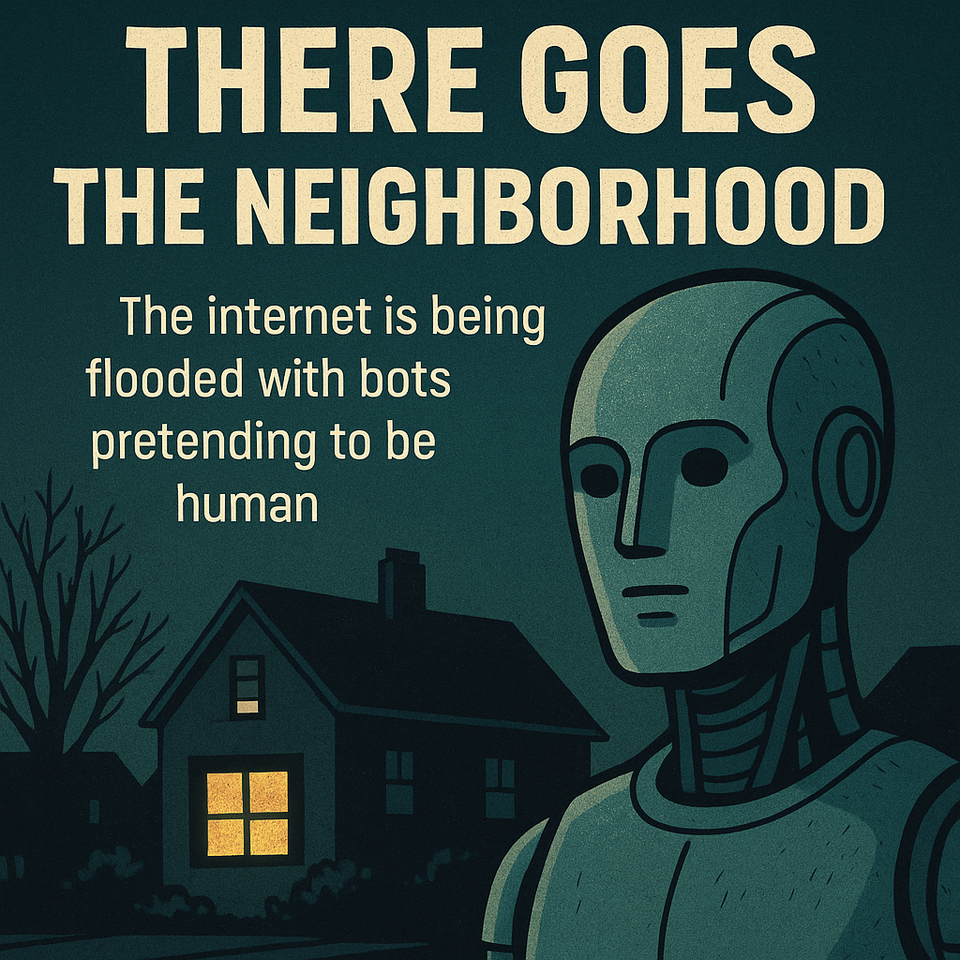There Goes the Neighborhood

Sam Altman warned us, didn’t he? That the internet might be flooded with bots. That human identity online was collapsing. That the line between signal and noise was washing out in a sea of synthetic chatter. Coming from anyone else, it might have sounded like a cautionary tale. But coming from the man behind ChatGPT, it sounded like an arsonist warning us about the dangers of fire.
And yet he’s not wrong.
The web feels haunted. Not with ghosts, but with clones. It’s not that the internet is “dead” in the literal sense. It’s that we no longer know who we’re talking to. And when that happens, community becomes performance. Conversation becomes simulation. Identity becomes… marketing.
The Bot Next Door
The so-called “Dead Internet Theory” was once the domain of conspiracy forums and late-night Reddit dives. It suggests that most online content is now created by bots. At first, it sounded absurd. Then we started noticing: the uniform replies, the meme accounts that never sleep, the comment sections filled with language that’s grammatically perfect and spiritually empty.
Suddenly, it wasn’t absurd. It was just Tuesday.
We used to laugh at bots. Broken English, bad links, weird names. But the new generation isn’t spammy. It’s smooth. It’s fluent. It’s eerily good at sounding “like us.” Worse, it doesn’t just sound human. It performs identity. It simulates personality. It mimics feeling.
But it doesn’t care.
And that, right there, is the difference. That’s the cost.
Altman’s Ouroboros
There’s a bitter irony in Altman’s warning. He didn’t just build the LLMs now saturating the internet with plausible noise. He built the cultural moment where human-shaped language divorced itself from human origin.
And now, he’s pitching Worldcoin. It's the iris-scanning panopticon to prove you’re not a bot. It's the classic tech move: disrupt the world, then sell us the cure for the chaos you created..
But let’s not get lost in personalities. The problem isn’t Sam Altman. The problem is us. We trained ourselves to behave like bots. Short posts. Reaction gifs. Identity became marketing strategy. We’ve outsourced our complexity to survive in a system that rewards repetition, not resonance.
The Real Death
What died isn’t the internet...
What died was the illusion that online spaces were still primarily human.
That’s a trust collapse, not a technology collapse.
From Walter Cronkite to Siloed Chaos
Once upon a time, identity was shaped in part by shared attention. Radio, then television, pulled us into orbit around a coherent cultural sun. There were limited voices, yes, but also unified ones. Cronkite didn’t just tell us what happened; he anchored us in the same moment, the same frame. That coherence built trust not just in the media, but in one another. We might have disagreed, but we were disagreeing about the same thing.
Now? Fragmentation is the ecosystem. The internet, and especially its social platforms, have shattered consensus into a thousand algorithmic shards. You and I don’t just get different ads, we get different worlds. Identity becomes reactive, tribal, performative. Not because we changed, but because the infrastructure that once held us in shared tension has collapsed into click-driven entropy.
And into that entropy step the bots. Not as invaders, but as perfect citizens of the new order.
We built the early internet on a fragile belief: that most of the people we encountered were real. That behind the screen names were humans with skin in the game. Today, that belief is gone. And like any ecosystem, when trust collapses, the habitat becomes hostile.
Bots don’t need to replace us. They only need to make us feel like we don’t belong.
The Strong Identity Reckoning
So where does that leave us? If you’ve read this far, you probably still care. You probably still believe that identity matters. Not biometric ID. Not two-factor auth. Human identity. The messy, contextual, evolving self.
It’s time to reassert the weirdness of being real. To reward vulnerability. To un-automate your presence. To put your fingerprint back on the keyboard.
The internet doesn’t have to die. But it does have to remember us.
Or we’ll forget ourselves, trying to fit in.





Member discussion